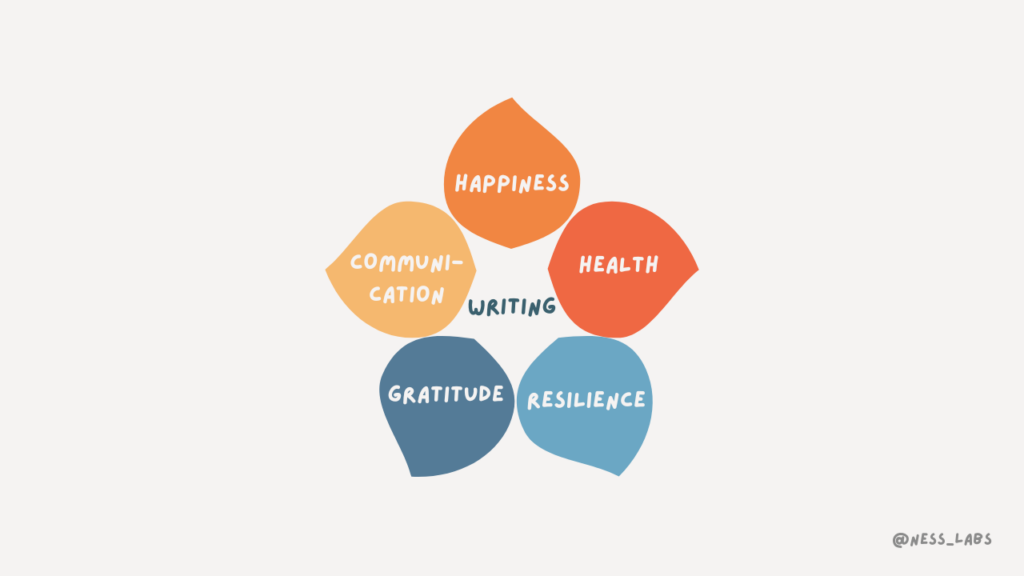We don’t realize how much time we spend writing every day: we text our friends and families, we leave comments on social media, we send emails, we create documentation, presentations, and more.
Well, good news: writing is actually good for you. Let’s explore the science-based benefits of writing and how you can make the most of this amazing tool only humans have been found to use.

1. Writing makes you happier and healthier
Regularly writing about your ambitions could be the key to a happier, healthier you. In a fascinating study, researchers compared the impact of writing about past traumas to writing about one’s “best possible future self.”
While both approaches yielded similar positive outcomes, there was a crucial difference. Participants found that exploring their aspirations for just 20 minutes a day significantly improved their well-being while being less upsetting than writing about their past traumas. This shows that turning inwards doesn’t always mean you need to look at the past.
And writing about your ambitions doesn’t have to be private either. According to Dr Alice Flaherty, a neuroscientist at Harvard University, online writing may trigger the release of dopamine, similar to other dopamine stimulants such as listening to music and looking at art.
By writing online, you may have some of the same therapeutic effects you would get from writing privately, with the added benefit of accountability. That’s a pretty good deal for an activity that’s completely free.
2. Writing makes you more resilient
If you’re going through a difficult experience, writing can help you cope better. A study that followed recently fired engineers found that the ones who consistently engaged with expressive writing were able to find a new job faster.
“The engineers who wrote down their thoughts and feelings about losing their jobs reported feeling less anger and hostility toward their former employer. They also reported drinking less. Eight months later, less than 19% of the engineers in the control groups were reemployed full-time, compared with more than 52% of the engineers in the expressive writing group,” explains Adam Grant, an organizational psychologist at Wharton University.
By expressing our thoughts and emotions on paper, we can process difficult experiences more effectively, reduce negative feelings, and even improve our practical outcomes. Whether you’re facing job loss, personal setbacks, or any other hardship, taking the time to write about your experience could help you bounce back faster and stronger.
3. Writing increases your gratitude
Practicing gratitude can enhance your empathy, increase your self-esteem, help you sleep better, improve your overall psychological health, and more. And writing is a great tool to practice gratitude.
According to research, people who take the time to reflect on the good things in their life once a week by writing them down are more positive and motivated about their current situation and their future. We naturally tend to dwell on things that go wrong or not as well as we expected, so it’s a great exercise to reflect on the things you’re grateful for by writing them down.
Added bonus if you also take the time to thank the people who supported you so they know you’re grateful for their help. Not only will you unlock the inherent benefits of practicing gratitude, but you’ll get to connect with others at a deeper level—another good practice for your mental health.
4. Writing helps you communicate clearly
It may sound obvious, but writing regularly has been shown to help people communicate complex ideas more clearly. You know how sometimes you want to explain something and feel like it sounded better in your head? Writing is a great way to flex to practice translating what can feel like confusing thoughts into words other people can make sense of.
The act of writing forces you to organize your thoughts and break down complex ideas into simpler, more digestible parts. This process not only helps others understand your ideas better but also deepens your own comprehension of the subject matter.
This has benefits both in terms of emotional intelligence—expressing how you feel—and in what are considered hard sciences such as mathematics, where complex concepts often need to be explained clearly.
The takeaway here is that writing is not just a means of recording information, but a powerful tool for clarifying and refining your thoughts. By regularly engaging in writing, whether it’s explaining a scientific concept, detailing a work process, or even articulating your feelings, you’re essentially training your brain to communicate more effectively.
This improved communication skill extends beyond writing itself, enhancing your ability to express ideas clearly in verbal interactions as well. So, the next time you’re grappling with a complex idea or struggling to explain something, try writing it out.
You might even progressively build a writing habit—a great foundation to a version of you that’s happier, healthier, more resilient, more grateful, and a better communicator… What’s not to like about writing?
